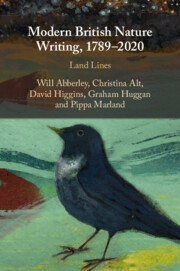Chapter 3 - Modern
Published online by Cambridge University Press: 10 March 2022
Summary
Chapter 3 addresses the Modern period. As good a way as any of designating the period is via Eric Hobsbawm’s moniker the Short Twentieth Century (1914–91), which he sees as an age of extremes marked, especially in its first half, by a sequence of potentially world-ending catastrophes bookended by the two world wars. Much nature writing of the time evidences this apocalyptic trend, though it also takes heart in the regenerative properties of nature, which is viewed, via the lenses of such fast-developing disciplines as ecology and ethology, with an increasingly scientific eye. The first part of the chapter draws accordingly on writing which, informed by evolving ecological understandings, also debates the protectionist measures needed to combat species extinction in an ecologically threatened world. These ecological threats are then brought to bear on early- to mid-twentieth-century rural writing, which is often all too hastily viewed as reacting against the modern forces of industrialisation and urbanisation, but is better seen as belonging to a complex machinery of rural representation adapted to the cultural needs of post-war England as well as to the new technological demands of a rapidly modernising world.
- Type
- Chapter
- Information
- Modern British Nature Writing, 1789–2020Land Lines, pp. 131 - 196Publisher: Cambridge University PressPrint publication year: 2022



